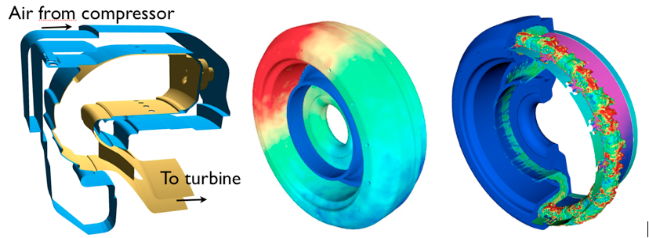INTECOCIS Objectives
The field of INTECOCIS is combustion.
The project aims at introducing recent progress in the field of High Performance Computing (HPC) for combustion simulation into studies of Combustion Instabilities (CI).
Combustion Instabilities are a major danger in multiple European programmes where new combustion systems are designed to diminish fossil fuel consumption and pollution as well as to limit climate impact. CIs are due to a resonant coupling of combustion processes with other phenomena, acoustics in most cases. Even though some of the theoretical ground for understanding CIs is available, they cannot be predicted with sufficient precision today and this weakness in our present simulation tools is a major risk: CIs can lead to oscillations of the combustor flow, causing vibration, extinction, loss of control, structural damage, explosions.
- The first target of INTECOCIS is to build simulation tools to predict the occurrence of CI in future combustors before their construction. In order to achieve this goal, the simulation tools used today for CIs must integrate recent HPC capacities and have the capabilities and brute power required to compute, understand and control CI phenomena.
- A second objective is to add Uncertainty Quantification (UQ) methods to CI tools.
- The project will integrate experimental validations and industrial applications. The tools will be made available to European laboratories working in the field of combustion instabilities.
INTECOCIS is lead by two teams: the PSC (Particle Sprays and Combustion) team at IMFT (CNRS) that will provide the CI expertise and the CFD team at CERFACS that masters HPC aspects required for combustion simulations.
The details of the project are presented here:
MOTIVATION: a short presentation of the context and of the project objectives
SIMULATION TOOLS FOR COMBUSTION INSTABILITIES: the massively parallel solvers used in INTECOCIS
WORK PROGRAM: a description of the work program for the next five years



